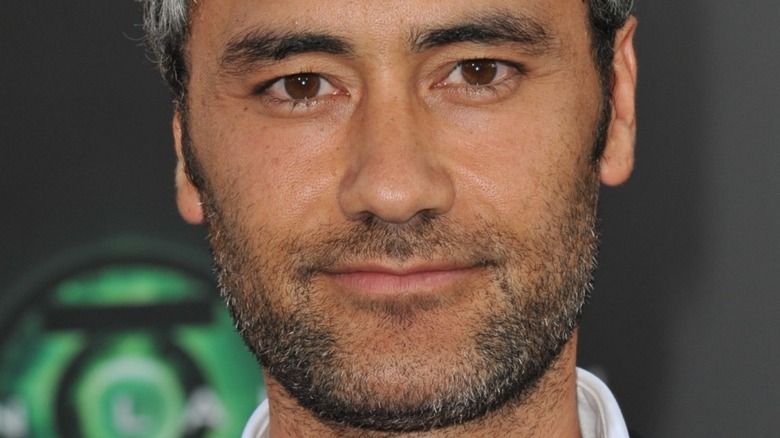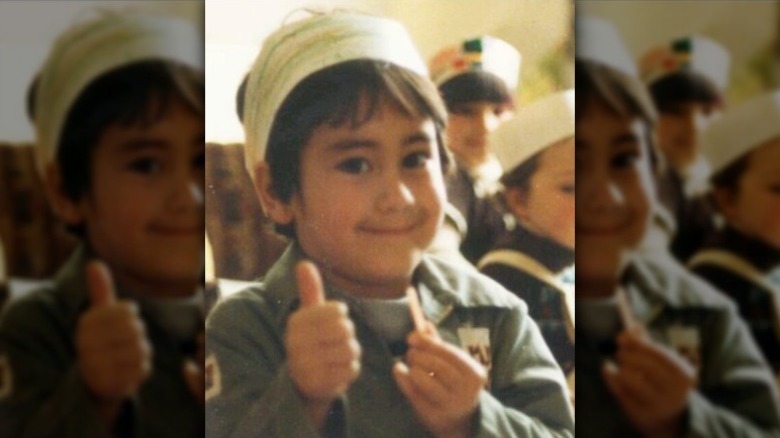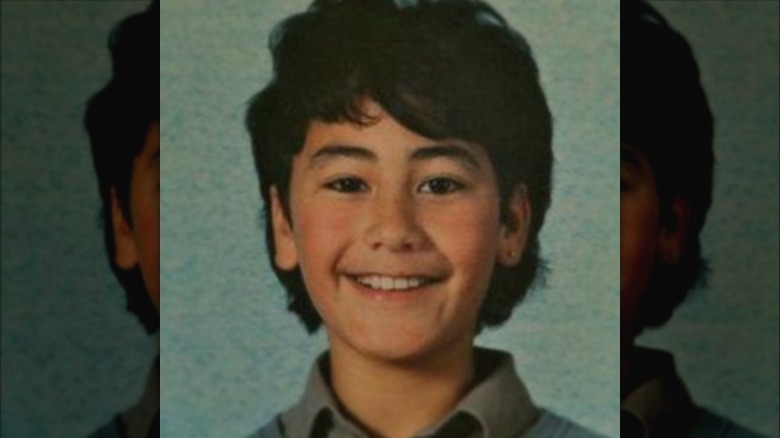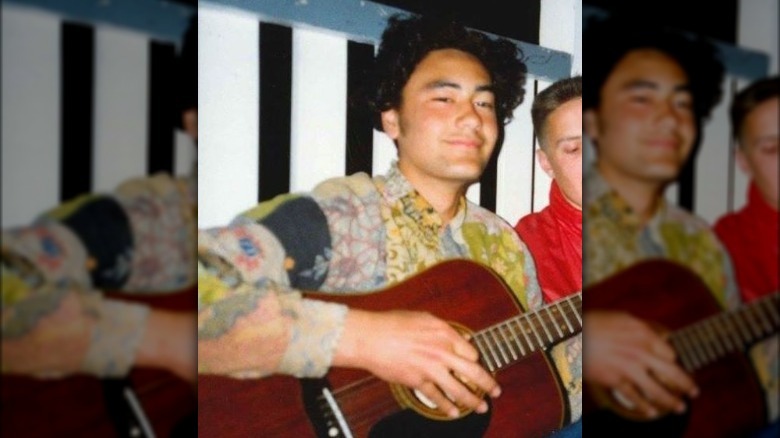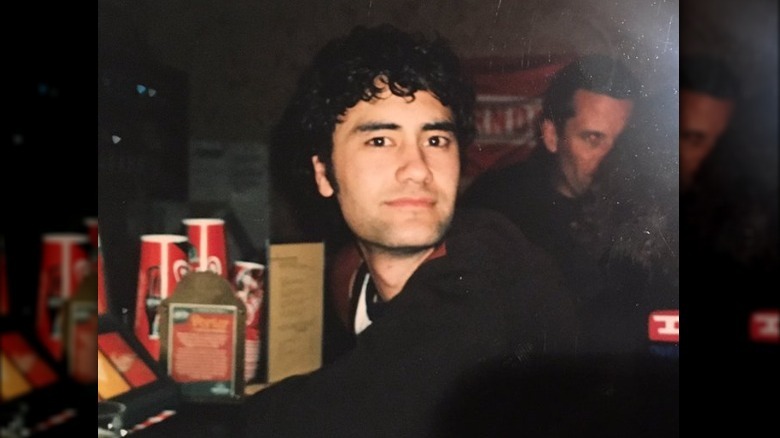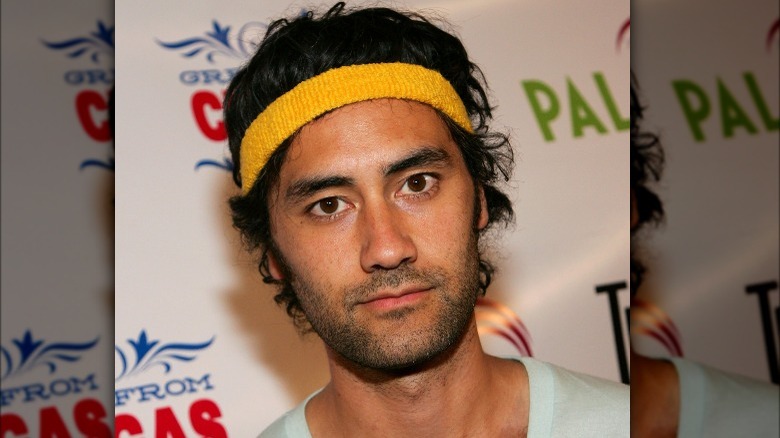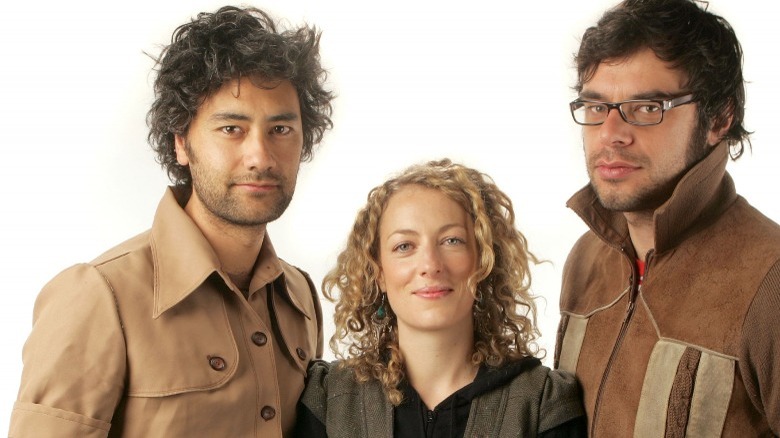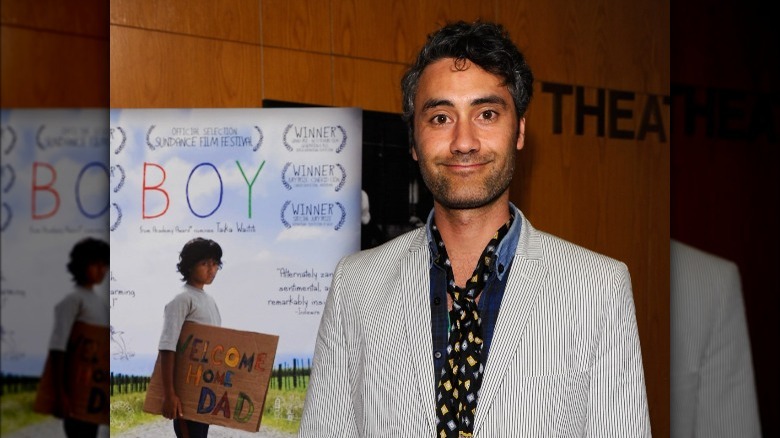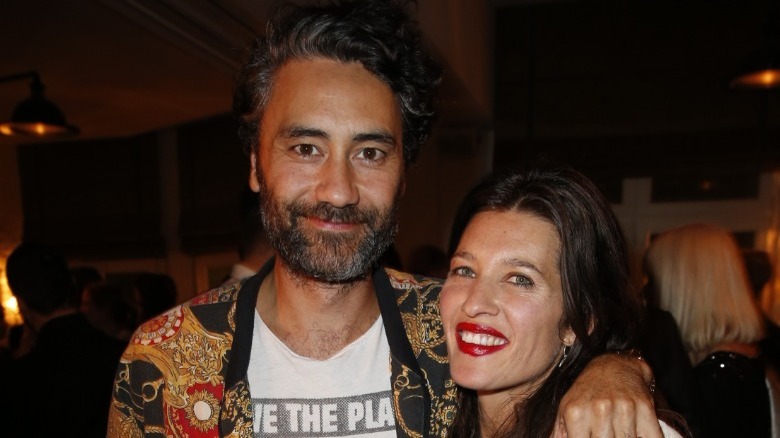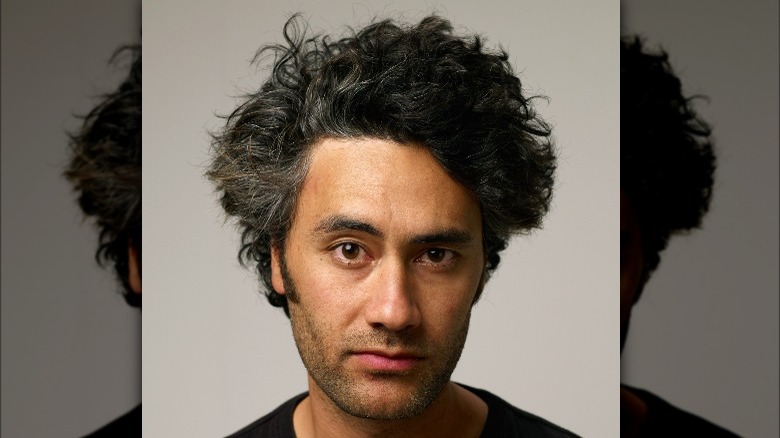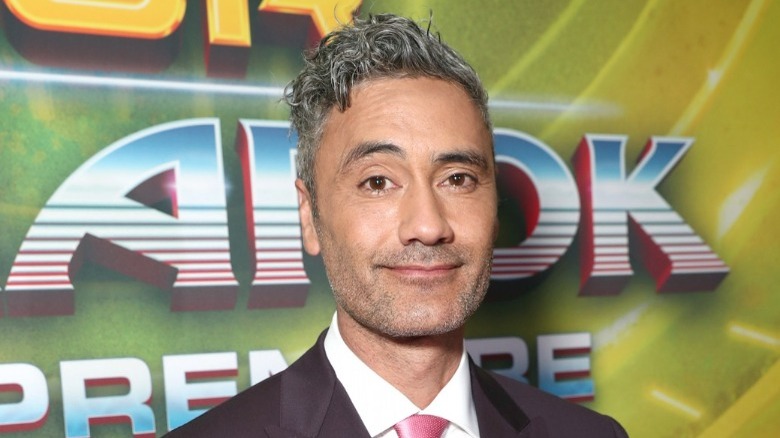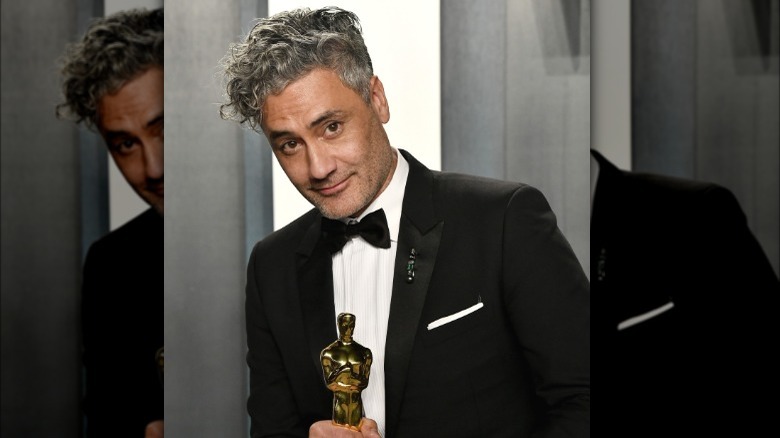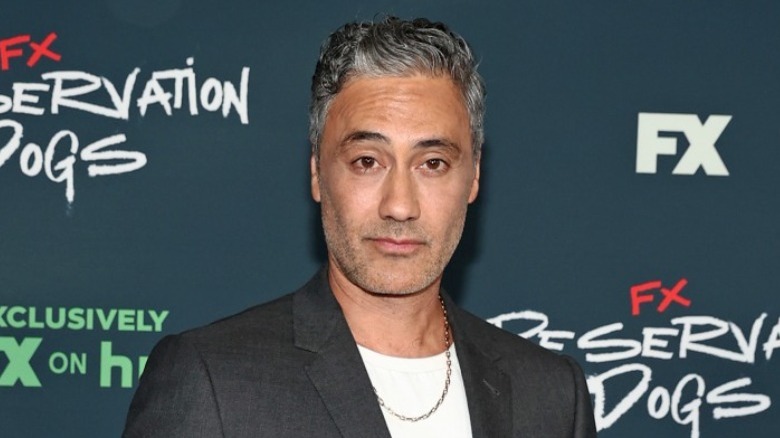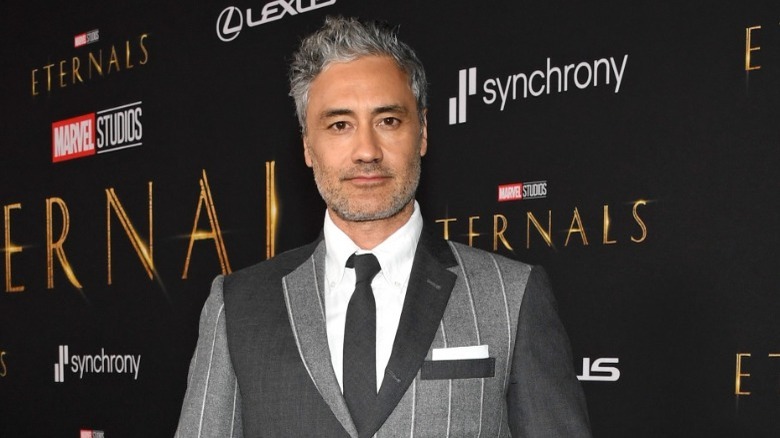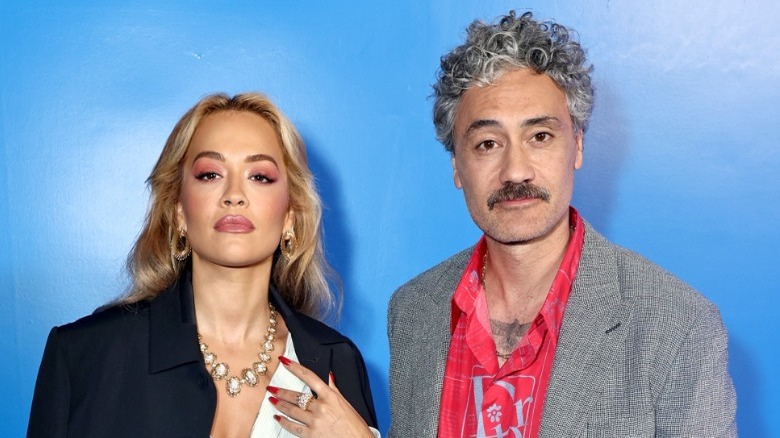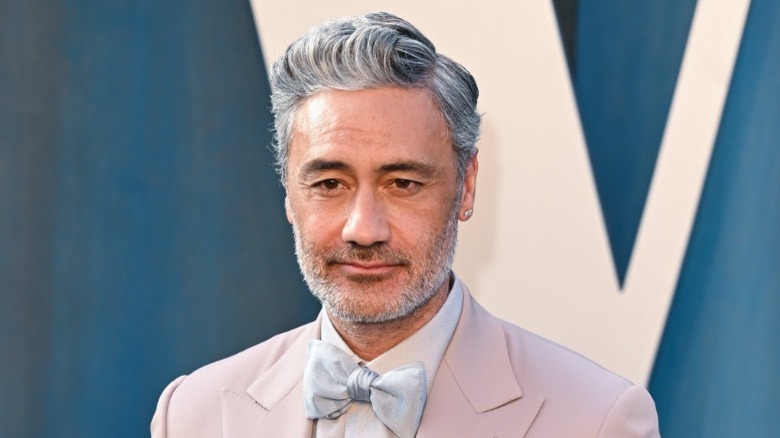The Transformation Of Taika Waititi From Childhood To 46
There's no doubt that Taika Waititi has been enjoying a moment. After revamping a Marvel franchise and winning an Oscar for his 2019 film "Jojo Rabbit" — which he wrote, directed, and starred in — the New Zealander has become a highly sought-after talent. Known for his quirky sense of humor and ability to make authentically heartfelt movies, the filmmaker's signature storytelling style has been embraced by audiences worldwide.
Explaining the core elements that make up a Taika-Waititi-comedy, he told The Sydney Morning Herald, "I like having that balance where you have a little drama or that you pull the audience in with the laughs and then you sock it to them with the actual message. That's what the power of comedy is. And I don't think dramas are as powerful in that sense."
Named one of the most influential people of 2022 by TIME, it's clear that the multi-talented director-producer-writer-actor will likely be continuing on his upward trajectory for some time to come. His journey so far has certainly been a fascinating and unconventional one, from his days as a New Zealand indie filmmaker and comedian to becoming a Hollywood star and big-budget director. Let's take a closer look at the transformation of Waititi from childhood to 46 years old.
Taika Waititi's proud mixed heritage
Born in 1975, Taika Waititi formerly used his mother's surname, Cohen. However, he started to go by his father's surname, Waititi, after the success of his first film. "I always used both names throughout my life according to where I was ... Because I made my first short film in that area where I was known as Waititi, that was the name that was put on the film," he explained to Cultural Daily.
Waititi has described himself as a Polynesian Jew because his mother is Russian-Jewish and his father is Māori, per The Jewish Chronicle. Speaking to Wired, the star explained that his parents — who separated when he was 5 years old — were an unlikely pairing. While his mom was a schoolteacher, his dad was part of a motorcycle gang. They met in a prison where his father was briefly an inmate — his mother was bringing books to the facility for charity work.
In addition to his Indigenous and Jewish heritage, he also revealed that he was a touch French-Canadian when sharing an ancestral story on the podcast, "Thanks for Trying." According to Waititi, his great-great-great grandmother was a Māori princess who had a child with a French-Canadian whaler. "He tried to steal the baby and take her back to Canada ... our warriors — bad a** dudes — rode horses across the land ... and [took] the baby back and because of them, I'm here now," he explained.
He grew up in Wellington and Waihau Bay
After his parents' separation, Taika Waititi split his childhood between Wellington, the capital of New Zealand, and Waihau Bay, a part of the tribal lands of Te Whānau-ā-Apanui. During his 2010 TEDx Talk, "The Art of Creativity," he explained, "I come from a very mixed background and as a result, I've always had trouble deciding who I was and what I wanted to do." Waihau Bay was a very small town, and his school only had 28 students in attendance. The majority of his time, however, was spent with his mother in the much more metropolitan city of Wellington.
The dichotomy of these two environments deeply influenced Waititi as an artist. Both places have served as the primary inspiration for his work. In an article about "The Great Kiwi Childhood" for Stuff, he wrote, "I think my childhood shaped what I do today. I think the way that I write, the things that I tend to put in my films, often there are jokes for people who grew up in that time. Or just things that I have been thinking of since then."
He experimented with a lot of art forms
Throughout his adolescence and 20s, Taika Waititi knew he was an artistic person but didn't immediately know where to direct his creative energy. "I wanted to do everything. I wanted to try every single thing," he explained in his TEDx talk. "I come from a background where people will say, 'No, you have to have one job and stick with it.' Well, I don't believe that. I think in this day and age, people have things they want to express and you need to have a wide range of tools."
He subsequently tried his hand at photography, fashion, animation, and stage performance before settling into visual art for much of his 20s, and described a lifelong love of painting during his TEDx talk. For his 1999 painting series, "Dirty Money," Waititi used his signature dry wit to tackle issues of systemic and historical racism. According to Auckland Art Gallery, "This series of reimagined New Zealand bank notes ... references our country's colonial history with jest to reconstruct tropes of power."
Like many of his future films, his visual art brilliantly combined humor and serious themes to deliver a heartfelt message. Eventually, Waititi would discover that film was the perfect medium to combine all of his former creative endeavors.
He focused on comedy in college
Taika Waititi attended Victoria University in Wellington where he studied theater. Graduating in 1997, he spent his college years exploring comedy, especially after meeting Jemaine Clement, who would later become one half of the parody duo "Flight of the Conchords." After they met at an audition for a university-produced stage show, Clement and Waititi hit it off, according to The New Zealand Herald. Their comedic chemistry led them to form the comedy duo "Humourbeasts" and the ensemble group, "So You're a Man," which included Bret McKenzie, the other half of "Flight of the Conchords."
In 1999, the Humourbeasts won the Billy T. Award, a New Zealand honor that acknowledges potential in up-and-coming comedians. Waititi and Clement have consistently worked together ever since, on projects including "Flight of the Conchords," "Eagle vs. Shark," and "What We Do in the Shadows."
The burgeoning comedian established more than one long-lasting relationship in these early days. He also met Rhys Darby, who has frequently appeared in Waititi's films over the course of their 20-year friendship. Along with Clement and McKenzie, the four of them became a powerful comedic force in the early 2000s, culminating in the cult success of HBO's "Flight of the Conchords." During an episode of the podcast, "The Last Laugh," Darby reflected on the experience, "We were all completely out of our depth, but used each other for support ... So that's where we started our brotherhood, really, of us against the world."
Depicting a stripper inspired him to start writing
In his late 20s, Taika Waititi started taking on-screen acting jobs. One of his first television performances was playing a male stripper on the New Zealand TV show "The Strip." During his TEDx talk, the filmmaker looked back on the role as being a cringe-worthy experience, but not one without value. "I remember sitting around in the green room in my g-string thinking, 'why am I doing this?'" he reflected. On the upside, seeing lower-quality art in action inevitably inspired him to write his own scripts.
In an interview with TIME, he described how the role pushed him to want more for himself. "I was being paid money. So on the one hand, I was eating and paying rent," he explained. "On the other hand. I was creatively depressed because I was getting my body waxed and having to eat tuna all day. I remember thinking, 'I'm helping to make someone else's bad idea. I'm sure I have better ideas than this.'" The role was ultimately a useful turning point in Waititi's life that nudged him into the world of writing and directing — though it does mean he has to forever deal with fans tweeting shirtless photos of his younger self much to his dismay.
Taika Waititi became a filmmaker in his 30s
Having spent his twenties exploring the great expanse of artistic expression available to him, Taika Waititi was a late-bloomer in regards to making movies. "With a lot of filmmakers, it's been their dream to make movies since they were kids. It wasn't my dream until I was 30," he told The New York Times. While he may have gotten a late start in the film industry, he made up for it with immediate success. The first film he ever made, a short film called "Two Cars, One Night, "was nominated for an Oscar in 2005. Ever up for endearing silliness, Waititi pretended to be asleep when they announced his name at the ceremony.
The short film's success pushed Waititi to continue pursuing filmmaking. He had finally found the art form he was meant to stick with, and he had plenty of support to do so. "In New Zealand, if you do anything well, you basically get encouraged by the prime minister to keep going," he explained to WIRED. "So it was like an arranged marriage. I was forced to fall in love with film. And eventually I did." His first feature film was "Eagle vs. Shark" in 2007, which starred his girlfriend at the time, Loren Taylor (née Horsley), and his friend and collaborator Jemaine Clement. A comedy about two awkward people falling in love, the film was met with mixed reviews.
His next feature films broke box office records
"Eagle vs. Shark" wasn't exactly a box-office hit but that was okay with Taika Waititi. The film was seemingly great practice for the movie he really wanted to make – "Boy," from a script he had written prior to "Eagle vs. Shark." He explained to SF Gate, "I wanted to make a feature film, but I didn't know how ... 'Boy' was a more important story to me, so I decided to take a break and learn how to make a feature film and then come back to it once I figured out my stuff." His patience paid off.
Set in Waihau Bay, where Waititi partly grew up, the coming-of-age story also featured a cast of Māori actors and is arguably his most personal film. On top of writing and directing the flick, he also played the titular character's father and used his former school and childhood home as shooting locations. "I wanted to shoot in my hometown," he said in an interview with SBS. "If I was going to write a film about kids growing up in the country, it was just the obvious setting."
In 2010, the movie became the top-grossing New Zealand film of all time, per Screen Daily. His 2016 movie "Hunt for the Wilderpeople" would also go on to become an instantly-successful New Zealand classic that broke his own record, meaning he can say he made the two highest-grossing New Zealand films of all time.
Waititi married Chelsea Winstanley in 2011
Taiki Waititi had been in a relationship with his "Eagle vs. Shark" co-writer and star, Loren Horsley (now Loren Taylor), since the mid-90s, per Los Angeles Times. By 2010, however, the relationship appeared to be long over and the star had struck up a romance with Chelsea Winstanley, a fellow filmmaker from New Zealand. The pair married in 2012 and went on to have two children together, per Daily Mail.
In an interview with The New Zealand Herald, Winstanley discussed how she increasingly felt overshadowed by her husband during their marriage. "I'm just sick of women portrayed as living in the shadow of their partners, that's all. I made one film with him, I was a filmmaker before I met him and I continue to do my own stuff," she told the publication in 2018, adding, "There was a lot of resentment building up." That same year, Page Six reported that the couple had quietly separated. Waititi and Winstanley are now divorced and share custody of their two daughters, Te Kāinga o te Hinekāhu and Matewa Kiritapu, according to Wired.
The vampire joke that became a franchise
Taika Waititi and Jemaine Clement hatched the idea of "What We Do in the Shadows" in 2005 and eventually made it into a feature film in 2014. During a Q&A with BAFTA, the filmmaker explained why the comedic mockumentary about a group of vampire flatmates took so long to develop. "I think we write together well but it's excruciatingly slow," he said. "We spent maybe 6 or 7 years writing that." The film immediately garnered a reputation for being a cult classic.
In 2019, two TV projects were created based on the movie — the New Zealand show, "Wellington Paranormal" and the FX series "What We Do in the Shadows." On "Jimmy Kimmel Live," Waititi joked, "We've managed to stretch that two-minute joke of vampire flatmates out to a movie and now ... a TV show." Clement created and ran the first two seasons of "What We Do in the Shadows" with Waititi directing a few episodes. However, season 4 of the series was handed over to other creators with Clement confirming the news on Twitter.
In 2017, Waititi revealed that he and Clement were working on a sequel called "We're Wolves." As Rhys Darby told comingsoon.net in 2020, that project is yet to come to fruition. "I text Taika like once or twice a year asking, 'What's happening with 'We're Wolves?' When are we doing it?' Unfortunately, they're both just super busy, so there's been no real movement on the movie."
Thor: Ragnarok was a career turning point
In 2017, Taika Waititi landed his first major Hollywood directing job with the Marvel movie "Thor: Ragnarok." On an episode of the podcast "Thanks for Trying," the filmmaker suggested that Marvel execs wanted to bring in someone who could breathe fresh life to the superhero's story. Having seen "Boy," they were impressed and approached Waititi for the gig. "They liked the idea that I could do comedy but then also with these films the thing that makes them work ... is having heart ... and being able to tell a story which makes the audience feel something," he explained. "So it was that combination I think they were looking for with Thor."
While some fans of the indie filmmaker may have wondered why he decided to turn to blockbusters as his next move, Waititi didn't see it as a sell-out. "I took it as an opportunity to learn a lot about filmmaking because all my stuff had been quite small and very personal," he explained. At $180 million, the budget was the largest the director had ever worked with. As The New York Times noted, "Thor has been the most boring of the Marvel movie superheroes" — Waititi's signature quirkiness, humor, and fun changed that and made the Norse God of Thunder cool again. "Thor: Ragnarok" instantly made more money than the previous "Thor" movies and is one of the highest-rated Marvel movies of all time, per Rotten Tomatoes.
He received an Academy Award in 2020
After the success of "Thor: Ragnarok," Taika Waititi finally had the momentum to make a movie he had been dreaming of for nearly a decade: a comedic adaptation of Christine Leunes's dramatic novel "Caging Skies" called "Jojo Rabbit," per The New York Times. The film centers on a German boy during World War II whose imaginary friend is Adolf Hitler (played by Waititi in the film). What sounds like a risky topic for a comedy became a surprisingly touching film that received a lot of praise and attention during the 2020 awards season.
Notably, the film earned Waititi an Academy Award for Best Adapted Screenplay, making him the first Indigenous person to ever win in a screenwriting category. In his acceptance speech, he said, "I dedicate this to all the Indigenous kids in the world who want to do art, and dance, and write stories. We are the original storytellers and we can make it here as well." And it wasn't the only honor he received that year. He also took home a BAFTA, was appointed Officer of the New Zealand Order of Merit by Queen Elizabeth II, and won a Grammy for the "Jojo Rabbit" soundtrack. After such an award-winning year, Waititi officially cemented his place in Hollywood.
Taika Waititi isn't just sticking to film
In addition to movies, Taika Waititi is also influencing the world of TV and streaming. Speaking to Gold Derby about his transition to TV, he explained, "I never really thought I'd have a huge involvement in television but it's now become one of my preferred and more enjoyable mediums." In 2021, the Oscar-winner co-created the FX series "Reservation Dogs" with Sterlin Harjo. The comedy follows four teenagers on a reservation in Oklahoma sans the stereotypes that have often plagued portrayals of Indigenous communities on screen. As Waititi suggested to Deadline, "All they want to do is see us riding whales, talking to the trees, playing flutes on mountaintops ... To subvert expectations is such a powerful thing." As he noted on "Jimmy Kimmel Live," the show featured a cast and crew made up entirely of indigenous people.
In 2022, Waititi produced the HBO Max pirate comedy, "Our Flag Means Death." As well as directing the pilot, he also played the role of Blackbeard opposite his long-time friend and collaborator Rhys Darby, who plays the main character, Stede Bonnet. Another groundbreaking series, "Our Flag Means Death" subverted expectations in its portrayal of queer romance. On Instagram, Waititi gushed about how proud he was of the show. Referring to the pirate power couple that he and Darby depict, he wrote, "It's not 'bromantic,' it's ROMANTIC." At the time of the season 1 finale, it was the most popular new series in America, surpassing Disney+'s Marvel series, "Moonknight."
He's making mad Marvel money
With multiple successful films, Taika Waititi's net worth has grown significantly over the past five years. According to Celebrity Net Worth, the filmmaker is worth $13 million as of this writing. Considering his highest-grossing movie has been "Thor: Ragnarok," it's likely that a large chunk of his fortune is Marvel money. With another Thor movie coming out in 2022, that net worth number will likely continue to grow even more. He did, after all, joke in the Oscars press room that his lawyer got him "a bloody good deal" on the movie.
Still, Waititi has made it clear he doesn't measure his worth as an artist in dollars and cents. In his TEDx Talk, he stated, "My idea of success is not money," and explained his belief that humans don't exist solely for financial gratification. "I think we're here to communicate and to share ideas," he said. "... Back home in New Zealand, we have the saying tēnā koe ... It's a Māori saying — tēnā koe is how you say hello. What it literally means is 'there you are' ... The fact that we're here, that we're even on Earth in the first place, I think that's success in itself."
He found love with Rita Ora
Taika Waititi and Rita Ora started dating in 2021 and, according to The Sun, things seem to be getting pretty serious. The tabloid claimed that the couple is engaged and planning a small wedding ceremony. An insider told the publication, "This isn't about them doing a big showy thing ... It's just about them being in love and deciding the time is right to formalize their relationship. They couldn't be happier." While it's worth taking such speculation with a pinch of salt, the couple are clearly smitten with each other.
Evidently, the pair were friends for years before they started dating. On Valentine's Day, 2022, Waititi posted a photo with the British pop star on Instagram captioned, "The night we met four years ago. We've been mates ever since. Then a year ago we decided to 'complicate' things but it just got easier."
The couple's tabloid-worthy status intensified when the paparazzi took photos of the two of them kissing "Thor" actor Tessa Thompson. The three of them were spotted looking awfully intimate with one another over drinks, prompting rumors of a possible throuple. However, Waititi laughed off the attention and eyebrow raises, telling The Sydney Morning Herald, "I was doing nothing wrong. It's fine."
What's next for Taika Waititi?
Clearly, Taika Waititi isn't at risk of enduring a shortage of work any time soon — or of toning down his filmmaking style, either. His second Marvel movie, "Thor: Love and Thunder," saw the filmmaker stepping up his game even further for yet another wild ride. During a livestream commentary of "Thor: Ragnarok" (via CBR) the eccentric director said of his second Thor outing, "It makes 'Ragnarok' seem like a really run-of-the-mill, really safe film ... This new film feels like we asked a bunch of 10-year-olds what should be in a movie and we said yes to every single thing."
Other projects in the pipeline include "Next Goal Wins," a movie about the underdog American Samoa football team, starring Will Arnett, Michael Fassbender, and his pal and frequent collaborator, Rhys Darby, per Deadline. Waititi will also be bringing his quirky humor to the "Star Wars" franchise sometime in 2023, per IGN. With "Our Flag Means Death" officially renewed for a second season, he will also be donning his Blackbeard leather pants and impressive facial hair once again, too. Though he's come a long way and given us a lot of quality stories, Waititi is clearly just getting started.

